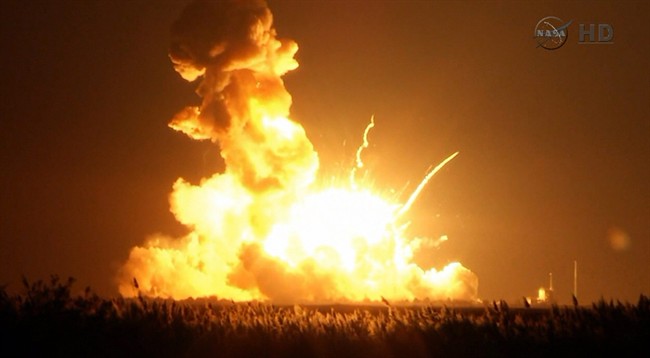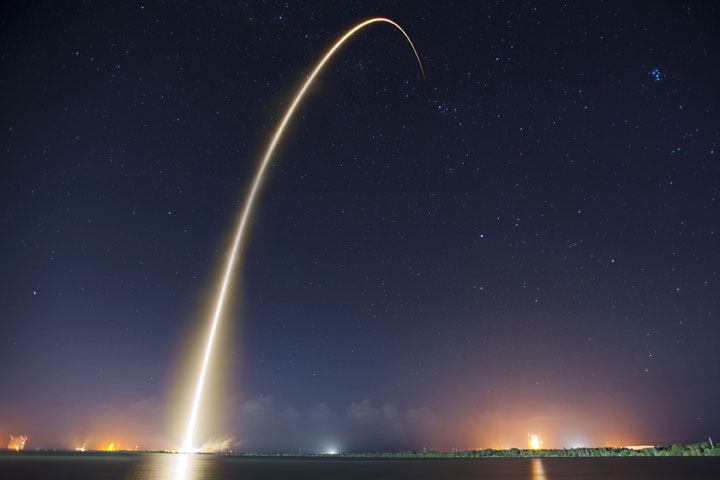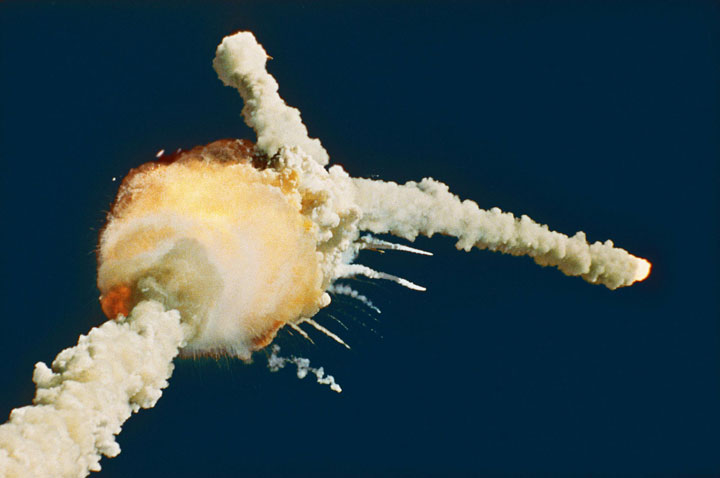TORONTO – Following the high-profile losses of two spaceships at the end of October, the future of private companies in the race to space may be in doubt.

On Oct. 29, an Antares rocket, built by Orbital Sciences Corporation, was lost in a spectacular explosion in Virginia. Then, on Oct. 31, Virgin Galactic’s SpaceShipTwo experienced a malfunction during a test flight, killing one pilot and injuring another.
WATCH: Nearby onlookers flee following rocket explosion
The new space race (rather than the United States and the Soviet Union vying for stellar supremacy) has entrepreneurs and fledgling aerospace companies vying for a piece of the space pie.
READ MORE: Boeing, SpaceX win bid to carry astronauts to International Space Station
In the past, NASA issued contracts to build its spacecraft to private companies. The space shuttle program, for instance, involved Lockheed Martin (external tank of the shuttle), Thiokol Corporation (and others; solid rocket boosters), Rockwell International (under NASA supervision; orbiter). But the shuttle was owned and operated by NASA.
At the moment, the U.S. depends solely on Russia to get astronauts into space, with a hefty price tag of $70 million a seat (their agreement ends in 2020). NASA has called the solution temporary, while some politicians have called it unsustainable. Antagonistic statements on Russia’s part haven’t helped: In response to U.S. sanctions, Russia’s deputy prime minister suggested in April the U.S. avail itself of a trampoline to send its astronauts in to space.
NASA still has a hand in long-term space exploration projects. Its Orion spacecraft — designed to get humans to asteroids, the moon or Mars — is set for its first test launch on Dec. 4. This is purely NASA’s. But increasingly, private companies are at the helm when it comes to space travel.
Following the two recent disasters, there are whispers about how tenuous that grasp might be.
READ MORE: Virgin Galactic founder Branson vows to find cause of deadly spacecraft crash
Growing pains
One expert chalks it up to growing pains, the same kind that NASA endured.
“Rocket science…it’s just hard,” said Paul Huter, a space design consultant who has done work for NASA.
“If you look back to the beginning of the original space race…NASA was blowing up rockets left and right. It took a while to figure out exactly how to do it and how to do it safely.”
Before Americans were sent into space, NASA’s rockets had a failure rate of about 50 per cent.
WATCH: A history of failed rockets
Even once NASA improved its rockets, human spaceflight was not without tragedy (think Challenger in 1986 or Columbia in 2003).
“High performance test pilots died all the time during development — that didn’t stop the programs,” said space expert and Royal Astronomical Society of Canada‘s executive director Randy Attwood.
“Fast forward 50 or 60 years to where we are today and you have these private companies and they don’t have access to all that legacy engineering,” Huter said. “SpaceX and Orbital and Virgin Galactic, they’re all pretty much starting from scratch.”

That means that they, as NASA did, will have their own growing pains.
“Unfortunately, as we saw with Virgin Galactic a couple of days ago, there’s a chance people are going to lose their lives,” said Huter. “That’s something that needs to be evaluated, and whether or not we can accept those risks.”
“NASA has lost people. So that proves that even with billions of dollars of government funding, things still go wrong.”
Private companies, trying to provide low-cost solutions to getting into orbit, don’t spend the billions that NASA did on designing and testing. And that means that if there’s a failure, it could come at a high cost.
Though, private companies aren’t keen on losses, be it human or otherwise.
From a purely economic standpoint, failure means the loss of a contract, and that means the potential loss of an entire company.
What it comes down to is that there is that for these private companies, there’s a lot riding on a successful rocket launch, mainly the survival of a company.
The day after Orbital Sciences — which has a $1.9 billion contact with NASA — lost its rocket, shares fell from $30.37 per share to $25.65.

Huter said that if a private company has a high failure rate, NASA likely wouldn’t accept the risk for manned spaceflight and would pull the contract. It could be the death knell for a company.
“These private companies, they need to mitigate the risk as much as they can too, because, the first time Virgin Galactic tries to launch five or 10 people on a suborbital flight and it crashes, they’re going to go out of business.”




Comments